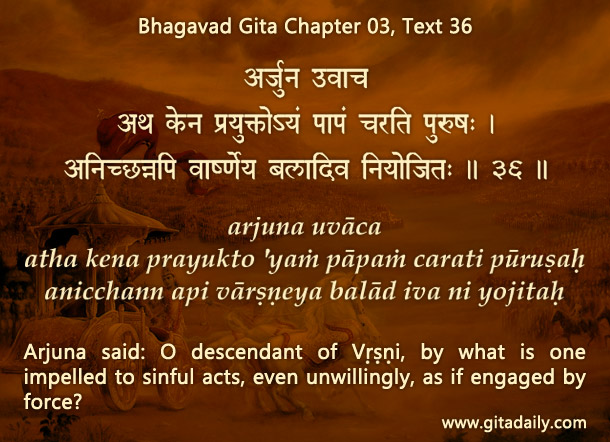“What makes us do things that we know aren’t good for us?” Most of us have probably asked ourselves this question after a binge of overeating, overshopping or oversurfing.
That Arjuna asks a remarkably similar question (03.36) speaks to the Bhagavad-gita’s universal relevance. On hearing from Krishna how dutiful diligence can empower us all to live meaningfully, successfully, happily, Arjuna asks. “What obstructs us in such responsible conduct? What makes us act against our best interests?”
It would be understandable if an outer enemy had us shackled and forced us to do something self-defeating. But it’s far less understandable when we ourselves do something self-defeating. Or do we, really? Could it be that an enemy is forcing us to do those things — an enemy that is invisible because it is inside, not outside?
That indeed is Krishna’s unnerving assertion. A fearsome foe resides inside all of us: it is the self-destructive craving, identified generically as lust (03.37). Lust refers to not just sexual obsession, but also any self-sabotaging temptation. We need to vigilantly identify this inner force as an enemy and then resourcefully fortify ourselves to fight against it; otherwise, it will make our life hellish, as would an outer enemy.
Intriguingly, Krishna highlights this inner enemy when speaking to a warrior facing formidable outer enemies. What does this imply? That the inner war is just as important as the outer war, if not far more important. If we spend on our inner war a fraction of the thought and energy we spend in fighting our outer wars against external adversaries and adversities, we all can be so much safer, wiser, happier.
One-sentence summary:
We may or may not be fighting an outer war, but we all are fighting an inner war against an enemy that is out to destroy us.
Think it over:
- How can we appreciate the Gita’s universal relevance?
- How can we sense the presence of an inner enemy?
- How does the Gita convey the gravity of the inner war?
***
03.36: Arjuna said: O descendant of Vrishni, by what is one impelled to sinful acts, even unwillingly, as if engaged by force?
To know more about this verse, please click on the image


Leave A Comment